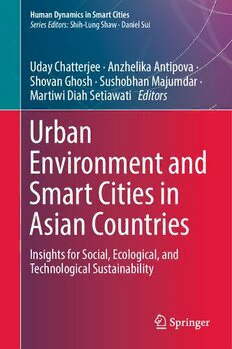
Urban Environment and Smart Cities in Asian Countries: Insights for Social, Ecological, and Technological Sustainability PDF
598 Pages·2023·22.695 MB·English
Most books are stored in the elastic cloud where traffic is expensive. For this reason, we have a limit on daily download.
Preview Urban Environment and Smart Cities in Asian Countries: Insights for Social, Ecological, and Technological Sustainability
Description:
This book offers a thorough description of the challenges posed by increasing global urbanization. In addition, comprehensive perspectives are offered on how the contemporary urban challenges of our time are tackled by existing designers, architects, urban planners, and landscape architects thereby considering climate change, migration, resilience, politics, and environmental degradation. It includes insights from environmental design, geography, strategic planning, and engineering design. It goes beyond the jargon of technical innovation, and exposes the political, social and physical effects of digitalizing the world in smart cities. The book focuses on the application of geospatial technology of smart cities – including system design for basic services, real-time control and the Internet of Things. It highlights the planning of land use, strategic development, and ecosystem-based knowledge to enhance economic growth and healthy urban environment and smart city management. The book also shows the contradictory aspects of smart city studies, and provides useful insights into the creation and execution of policies to strengthen decision-making processes in smart cities. This book leads the reader to a greater understanding of smart city growth, both theoretical and realistic and as such it provides an interesting read for urban geographers, urban designers and planners, environmental specialists, practitioners, students.
See more
The list of books you might like
Most books are stored in the elastic cloud where traffic is expensive. For this reason, we have a limit on daily download.
